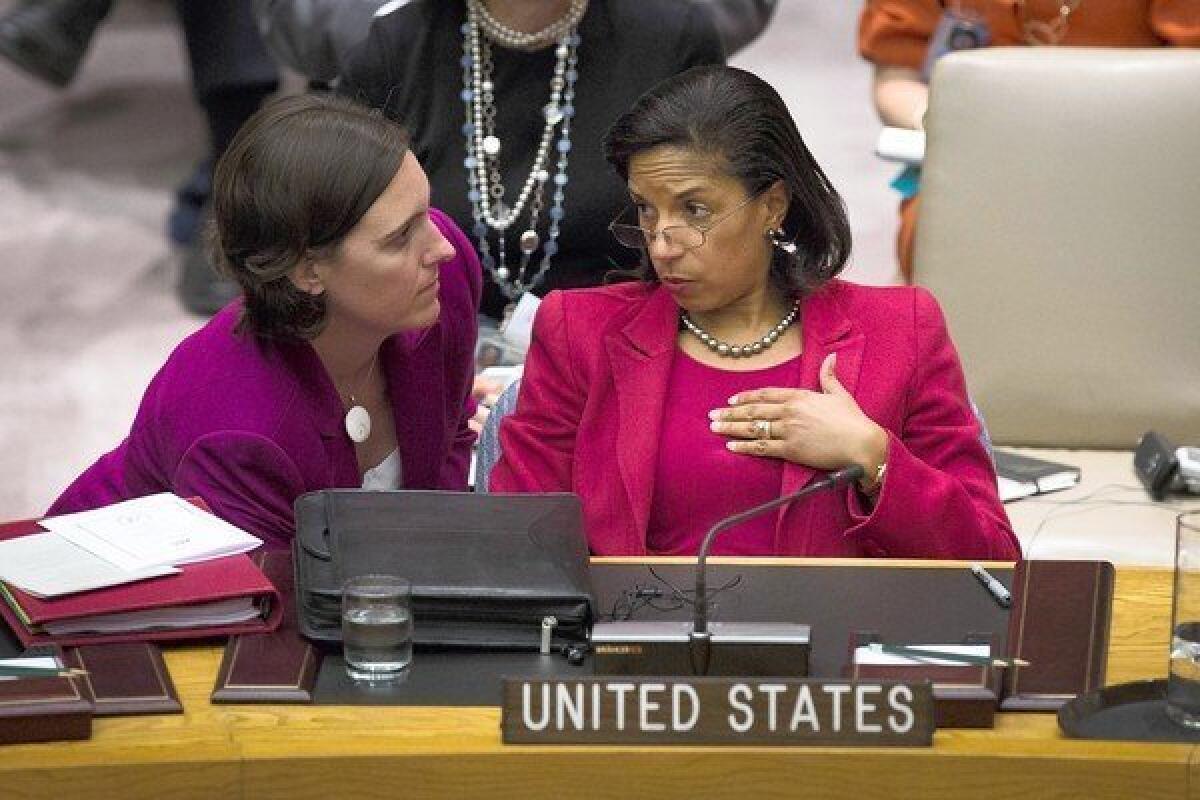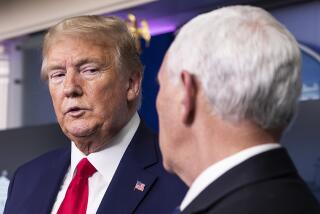Intelligence officials edited talking points on Libya attack

- Share via
WASHINGTON — Authorities with the Office of the Director of National Intelligence, in consultation with the CIA, decided to remove the terms “attack,” “Al Qaeda” and “terrorism” from unclassified guidance provided to the Obama administration several days after militants attacked the U.S. mission in Benghazi, a senior official said Tuesday.
The U.S. ambassador to the United Nations, Susan Rice, relied on the so-called talking points when she appeared on several Sunday TV talk shows five days after the Sept. 11 attacks in eastern Libya. She asserted that the violence, which killed four Americans, erupted out of a protest over a film made in the U.S. that mocked Islam.
Critics accused Rice and other administration officials of twisting the intelligence for political reasons when it later emerged that the CIA had concluded that the lethal assault involved militants, some of whom had links to Al Qaeda’s North African affiliate. The White House has argued that Rice was relying on information provided by the CIA and other agencies and didn’t deviate from it.
U.S. intelligence officials supported the administration claims Tuesday, contending that language in the talking points was changed by intelligence officers to protect information that was classified at the time.
“Early drafts of the talking points included several analytic judgments that were debated and adjusted during the internal intelligence community coordination process,” said the senior intelligence official, who spoke on condition of anonymity because the issue involved classified material. “The adjustments were focused on producing talking points that provided the best information available at the time, protected sensitive details and reflected the evolving nature of rapidly incoming intelligence.”
Officials at the CIA and at the Office of the Director of National Intelligence, headed by James R. Clapper, “were all communicating on an email chain, which is normal in our coordination process,” the official said. “Suggestions were being made and implemented in a collaborative manner.”
The CIA drafted the initial talking points, and they were not “edited to minimize the role of extremists, diminish terrorist affiliations, or play down that this was an attack,” said a second U.S. official familiar with how the material was edited.
David H. Petraeus, the former CIA director, told the House and Senate intelligence committees in closed hearings Friday that he believed almost immediately that the Benghazi assault was an organized terrorist attack, according to lawmakers who attended the hearings. But he said the CIA initially withheld reports that extremists with links to Al Qaeda were involved to avoid tipping off the terrorists.
Petraeus also said some early classified reports supported the possibility that some attackers were motivated by violent protests in Cairo earlier that day over the anti-Islam video.
When the CIA drafted language that Rice could use for her TV appearances, it circulated the language to officials at Clapper’s office, which has a supervisory role in the intelligence community. In the editing process, the word “attack” was changed to “demonstration,” and the phrase “with ties to Al Qaeda” was removed, officials said. The word “terrorism” also was removed.
If intelligence professionals were responsible for the changes, it might dispel charges from some Republicans that political operatives at the White House had manipulated the narrative to downplay the possibility of an Al Qaeda attack when the Obama administration was campaigning on its successes in degrading the terrorist group.
One of the most vocal critics, Sen. John McCain (R-Ariz.), said he was “somewhat surprised and frustrated” Tuesday after CBS broke the news.
During the Senate Intelligence Committee hearing last week, McCain said, “senior intelligence officials were asked this very question, and all of them, including the director of national intelligence himself, told us that they did not know who made the changes. Now we have to read the answers to our questions in the media.”
McCain said the episode “is another reason why many of us are so frustrated with, and suspicious of, the actions of this administration when it comes to the Benghazi attack.”
Ambassador J. Christopher Stevens and an embassy computer specialist were killed when the militants stormed and set fire to the U.S. diplomatic mission in Benghazi. Two CIA contractors were killed several hours later when mortar rounds were fired at a CIA compound about 1 1/2 miles away.
More to Read
Sign up for Essential California
The most important California stories and recommendations in your inbox every morning.
You may occasionally receive promotional content from the Los Angeles Times.











